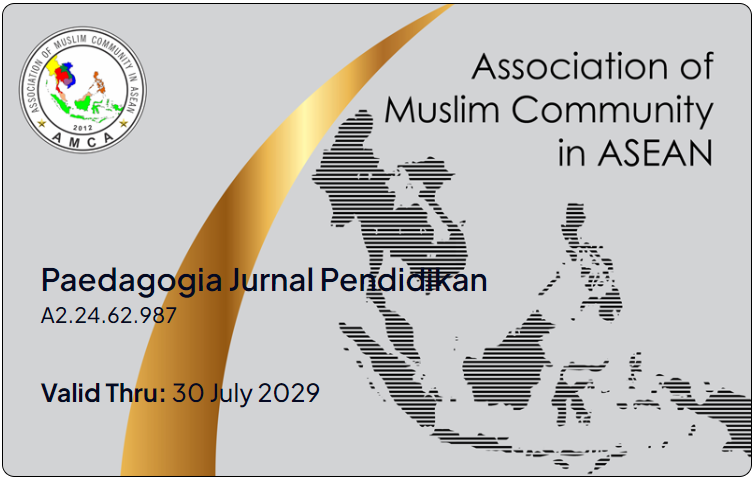Bridging the Digital Divide: Artificial Intelligence Adoption Among Lecturers in Kaduna State, Nigeria
Abstract
This study investigates the awareness, adoption, and impact of Artificial Intelligence (AI) technologies among lecturers in Kaduna State, Nigeria. It addresses three primary research questions: the extent of lecturers' awareness of AI-powered educational tools, the types of AI technologies currently adopted, and the impact of these technologies on academic activities. Utilizing a descriptive survey design, data were collected from a sample of 420 academic staff across four tertiary institutions using a validated instrument based on a modified Likert scale. The study employs one-sample t-tests to evaluate three hypotheses about awareness, adoption, and impact. Findings reveal that lecturers possess moderate awareness of AI applications and are highly familiar with plagiarism detection and content creation tools but need more understanding of intelligent tutoring systems and adaptive learning platforms. Adoption is selective; AI-powered research assistants and content creation tools are widely used, while technologies like Natural Language Processing (NLP) are less common. The study identifies a positive impact of AI on academic activities, enhancing collaboration and resource accessibility while raising ethical concerns. Statistical analyses indicate significant differences in awareness levels, adoption rates, and perceived impacts among lecturers. These findings suggest varied engagement with AI tools across educational settings in Kaduna State. The study concludes that while there is a positive perception of AI's educational impact, improvements in training and infrastructure are necessary to leverage these technologies fully. Recommendations include organizing workshops to increase familiarity with underutilized AI tools, integrating AI training into professional development, and establishing guidelines for ethical AI use in education.
Downloads
References
Adekanbi, B. (2023). Barriers to robotic process automation adoption in Nigerian universities: A case study of Kaduna State. Journal of Educational Technology in Nigeria, 18(2), 45-62.
Adeoye, I. A., Oladipo, A. T., & Olasanmi, O. O. (2021). Artificial intelligence in Nigerian universities: Challenges and prospects. International Journal of Education and Development using Information and Communication Technology, 17(2), 45-60.
Akgun, S., & Greenhow, C. (2022). Artificial intelligence in K-12 education: A review of challenges and opportunities. Journal of Research on Technology in Education, 54(S1), S1-S18.
Akgun, S., & Greenhow, C. (2024). Artificial intelligence in education: Addressing ethical challenges in K-12 settings. NCBI. https://www.ncbi.nlm.nih.gov/pmc/articles/PMC84 55229/
Ali, O., Murray, P. A., Momin, M., Dwivedi, Y. K., & Malik, T. (2024). The effects of artificial intelligence applications in educational settings: Challenges and strategies. ScienceDirect, https://doi.org/10.1016/j.sci.2024.01.002
Almeida, F., & Santos, J. (2020). Adoption of AI-driven plagiarism detection tools across faculties. Journal of Academic Ethics, 18(1), 35–52.
Anih, U. (2024). Lecturers' level of awareness of artificial intelligence as correlate of their digital competence. Journal of Educational Research in Developing Areas, 5(1), 59–67.
Anih, U., Rehman, S., & Amin, M. (2024). Exploring faculty perceptions and acceptability of AI in teaching and learning in universities. AI and Education, 1(1), 1–15.
Balogun, O. (2024). Factors influencing artificial intelligence adoption among higher education faculty in Northern Nigeria. International Journal of Educational Technology in Higher Education, 21(1), 12-28.
Balogun, O. (2024). Language won't keep Northern Nigeria away from AI train. BusinessDay. https://businessday.ng/news/article/language-wont-keep-northern-nigeria-away-from-ai-train/
Becker, S. A., Brown, M., Dahlstrom, E., Davis, A., DePaul, K., Diaz, V., & Pomerantz, J. (2018). NMC Horizon Report: 2018 Higher Education Edition. EDUCAUSE.
Celik, I., Sahin, S., & Aydin, M. (2022). Roles of teachers in artificial intelligence supported learning: A thematic analysis. Education and Information Technologies, 27(1), 1041-1066.
Chaudhry, S., & Kazim, E. (2022). Potential Risks of Artificial Intelligence Integration into School Education. SAGE Publications, https://doi.org/10.1177/02704676231224705
Chen, H., & Wong, K. (2022). AI technologies in assessment: A comparative study of STEM and non-STEM fields. Assessment & Evaluation in Higher Education, 47(2), 215–230.
DataReportal. (2024). Digital 2024: Nigeria — Global digital insights. The Author.
Eaton, S. E., & Crossman, K. (2018). Self-plagiarism research literature in the social sciences: A scoping review. Interchange, 49(3), 285–311. https://doi.org/10.1007/s10780-018-9333-1
Emenanjor, R. (2024). The state of natural language processing applications in Kaduna State universities. Nigerian Journal of Educational Technology, 15(3), 78-95.
Fernandez-Lopez, M., Garcia-Sanchez, E., & Martinez-Lopez, F. J. (2024). Longitudinal trends in AI adoption among university lecturers. International Journal of Educational Technology in Higher Education, 21(1), 1–18.
Flores-Vivar, J. M., & García-Peñalvo, F. J. (2023). Analysing the Impact of Artificial Intelligence and Computational Sciences on Student Performance. New Approaches in Educational Research, 12(1), 10-25.
High-Level Expert Group on Artificial Intelligence. (2019). A definition of AI: Main capabilities and scientific disciplines. European Commission. https://digital-strategy.ec.europa.eu/ en/library/definition-artificial-intelligence-main-capabilities-and-scientific-disciplines
Johnson, A., Smith, B., & Davis, C. (2022). Variations in AI adoption among university lecturers. Journal of Educational Technology, 45(3), 278–295.
Kim, D., & Kim, D. (2022). Perceptions of K-12 teachers on the use of AI-enhanced scaffolding systems to support students' scientific writing. Journal of Science Education and Technology, 31(2), 223-237.
Lythreatis, S., Singh, S. K., & El-Kassar, A.-N. (2022). The digital divide: A review and future research agenda. Technological Forecasting and Social Change, 175, 121359.
Mafara, R. M. (2024). Adoption of artificial intelligence in education: Challenges and possibilities. Asian Journal of Advanced Research and Reports, 18(2), 106-111. https://doi.org/10.9734/ajarr/2024/v18i2608
Nguyen, T. H., & Lee, S. (2020). Adoption of AI analytics tools in business education. Journal of Management Education, 44(5), 621–640.
Nye, B. D. (2015). Intelligent tutoring systems by and for the developing world: A review of trends and approaches for educational technology in a global context. International Journal of Artificial Intelligence in Education, 25(2), 177–203. https://doi.org/10.1007/s40593-015-0046-7
Omar, A., Peter A., M., Mujtaba, M., Dwivedi, Y. K., & Malik, T. (2024). The effects of artificial intelligence applications in educational settings: Challenges and strategies. Technological Forecasting and Social Change, 198, 122611.
Onyeagwu, E. (2023, June 30). The imperative for ethical considerations in AI adoption. This Day Live. https://www.thisdaylive.com/index.php/2023/06/30/the-imperative-for-ethical-considerations-in-ai-adoption/
Patel, R., & Singh, K. (2021). Disciplinary differences in AI technology adoption by faculty. Higher Education Research & Development, 40(2), 156–172.
Popenici, S. A., & Kerr, S. (2017). Exploring the impact of artificial intelligence on teaching and learning in higher education. Research and Practice in Technology Enhanced Learning, 12(1), 22. https://doi.org/10.1186/s41039-017-0062-8
Prather, J., Denny, P., Leinonen, J., Becker, B. A., Albluwi, I., Craig, M., Keuning, H., Kiesler, N., Kohn, T., Luxton-Reilly, A., MacNeil, S., Petersen, A., Pettit, R., Reeves, B. N., & Savelka, J. (2023). The robots are here: Navigating the generative AI revolution in computing education. In Proceedings of the 2023 Working Group Reports on Innovation and Technology in Computer Science Education (pp. 108-159).
Ramirez, E., Lopez, A., & Gonzalez, C. (2023). Uniform adoption of AI-powered learning management systems in higher education. Education and Information Technologies, 28(3), 3245–3260.
Russell, S., & Norvig, P. (2021). Artificial intelligence: A modern approach (4th ed.). Pearson.
Sallam, A. A., & Hossain, M. A. (2024). Utilization of artificial intelligence-based tools for teaching and research among lecturers. Sapientia Foundation Journal of Education, Sciences and Gender Studies, 6(1), 153–159.
Smith, J., & Brown, M. (2021). Examining AI technology adoption across academic disciplines. Teaching in Higher Education, 26(4), 502–518.
Suleiman, S. A., & Shehu, S. A. (2024). Artificial intelligence tools usage patterns among university lecturers in Kaduna State. Journal of Educational Innovation in Nigeria, 9(1), 33-50.
SUSAfrica. (2023, April 5). The impact of emerging AI technologies on Nigerian education. SUSAfrica. https://susafrica.com/2023/04/05/the-impact-of-emerging-ai-technologies-on-nigerian-education/
SUSAfrica. (2024, January 2). Understanding artificial intelligence tools in Nigerian education. SUSAfrica. https://susafrica.com/2024/01/02/understnding-ai-tools-in-nigerian-education/
Technext24. (2024, April 30). Kaduna government, Google launch first Hausa AI learning series to empower women. Technext24. https://technext24.com/2024/04/30/kaduna-government-google-launch-hausa-ai/
Thomas, G. (2022). Assessment of lecturers' awareness, readiness and utilisation of artificial intelligence for education in a Nigerian university. [Master's thesis, Federal University of Technology, Minna]. FUTMinna Institutional Repository.
Thomas, G., Gambari, A. I., Sobowale, F. M., & Shehu, B. A. (2024). Assessment of lecturers' utilization of artificial intelligence for education in a Nigerian university. International Journal of Educational Technology, 11(2), 45–60.
Thompson, R., Wilson, J., & Taylor, S. (2024). A meta-analysis of AI technology adoption by lecturers in higher education. Review of Educational Research, 94(1), 78–105.
Tsai, Y. S., Perrotta, C., & Gašević, D. (2021). Empowering learners with personalised learning approaches? Agency, equity and transparency in the context of learning analytics. Assessment & Evaluation in Higher Education, 46(4), 554–569. https://doi.org/10.1080/02602938.2020.1782345
U.S. Department of Education. (2023). Artificial Intelligence and the Future of Teaching and Learning. The Author.
Ukeh, B. O., & Anih, A. A. (2020). Utilization of artificial intelligence-based tools for teaching and research among lecturers in Federal University Otuoke, Bayelsa State Nigeria. Science Education Faculty of Education Federal University Otuoke.
United Nations Development Programme. (2024). Africa development insights: Artificial intelligence for development. UNDP.
Vassilakopoulou, P., & Hustad, E. (2023). Bridging Digital Divides: a Literature Review and Research Agenda for Information Systems Research. Information Systems Frontiers, 25, 955–969.
Vention. (2024). AI adoption statistics 2024: All figures & facts to know. The Author.
Wang, P. (2019). On defining artificial intelligence. Journal of Artificial General Intelligence, 10(2), 1-37. https://doi.org/10.2478/jagi-2019-0002
Williamson, B. (2024). AI in education is a public problem. Code Acts in Education.
Yakubu, I. (2024). Impact of artificial intelligence on workforce planning in colleges of education in Kaduna State, Nigeria. Journal of Association of Educational Management and Policy Practitioners, 4(1), 6.
Yakubu, I., & Pemida, R. O. (2024). Impact of artificial intelligence on workforce planning in colleges of education in Kaduna State, Nigeria. Journal of Advanced Educational Management and Planning, 4(1), 40-47.
Yilmaz, R., & Yilmaz, R. (2023). Is it harmful or helpful? Examining the causes and consequences of generative AI usage in higher education. Educational Technology Journal, 12, 1-15.
Zawacki-Richter, O., Marín, V. I., Bond, M., & Gouverneur, F. (2019). Systematic review of research on artificial intelligence applications in higher education – where are the educators? International Journal of Educational Technology in Higher Education, 16(1), 39. https://doi.org/10.1186/s41239-019-0173-8
Zhang, L., Wang, Y., & Liu, X. (2023). AI adoption patterns in higher education: A cross-departmental analysis. Computers & Education, 180, 104432.
Copyright (c) 2025 Paedagogia: Jurnal Pendidikan

This work is licensed under a Creative Commons Attribution-NonCommercial 4.0 International License.
The author agrees to the following conditions upon publishing a work to Paedagogia: Jurnal Pendidikan:
1. Each article is licensed under a Creative Commons Attribution-NonCommercial 4.0 International License. The author(s) recognizes that Paedagogia: Jurnal Pendidikan has the right to be the first to publish under a Creative Commons Attribution-NonCommercial 4.0 International License. This license permits the copying and redistribution of this material in any form or format, as well as the composition, modification, and creation of derivative works of this material for any purpose, but Non commercial, as long as the author is credited with the original work.
2. Authors may submit articles separately or arrange for non-exclusive distribution of manuscripts previously published in this journal in other forms (e.g., to the author's institutional repository, publication in books, etc. ), provided that the manuscript is acknowledged as having been published first in the Paedagogia: Jurnal Pendidikan.
3. A copyright submission agreement must attach each approved manuscript prior to publication. You may obtain the form for the copyright submission agreement here (INA) (EN).





























 This work is licensed under a
This work is licensed under a 